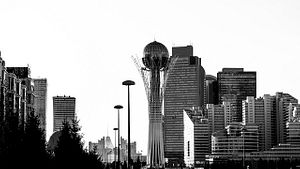After two appeals, Kazakhstan’s Prosecutor General overturned a Supreme Court decision and obtained the return of confiscated assets worth tens of millions of dollars to a group of former state officials close to ex-governor of the Atyrau region Bergei Ryskaliyev. Beyond the apparent benevolence of the courts, local press pointed to several events and rumors that could have led to the decision.
Sentenced in absentia to 17 years in prison for corruption and embezzlement, Ryskaliyev was once touted as a businessman-turned-bureaucrat, the gatekeeper of the hydrocarbon industry in Kazakhstan’s main oil region. In August 2012 he was removed “for health reasons” from his post; he soon fled the country to London. He was eventually charged as the kingpin of an “organized crime group.” As Ryskaliyev was removed, his alleged protector, Aslan Musin, was fired from his post as head of the Presidential Administration, too. In 2012, the downfall of Ryskaliyev was clear.
The sudden turn of events in recent months, therefore, raised eyebrows among observers.
In an interview with ZonaKz, political analyst Pyotr Svoik said that the system is such that institutions can never fail: “The Prosecutor was right then, when it confiscated the assets of the group and is right now as it asks for restitution.” Asked whether it is possible to earn billions of tenge and significant assets while serving in a public office, Svoik said: “Did the lord in a feudal system steal? No, he claimed what was his.” According to Svoik, Kazakhstan’s justice system, in practice, responds to feudal mechanisms.
Two Ways to Fall From Grace
In April 2012, former Ryskaliyev associate Salimzhan Nekpayev was arrested. Nekpayev had fallen out with Ryskaliyev in 2010, fled the country, and returned on a job for the consortium developing the offshore Kashagan project, one of the largest oil discoveries of the past generation. In what seemed an orchestrated move, Nekpayev sent a letter to the Prosecutor General accusing Ryskaliyev of corruption and embezzlement in August.
Days after the letter appeared, Ryskaliyev was fired from his top job at the regional administration and put under house arrest, awaiting trial. Before the trial, Bergei and his brother Amanzhan, a former MP, fled the country.
The official line, thus, was that Ryskaliyev’s corrupt practices, once unveiled by his former ally, were too shamelessly evident and he had to be brought to justice together with his associates.
There is a competing view, however.
In 2013, journalist Gennadi Benditsky wrote that Ryskaliyev could have sent thugs to Zhanaozen, an oil town in the Mangistau region, during the height of the worker strikes in December 2011, with the objective to damage the property of the state-company, Kazmunaigas.
The action was supposed to be a retaliation against the decision to appoint a new management team to the refinery in Atyrau, which allegedly failed to bow to the governor’s wishes. Ryskaliyev’s principal adversary in this struggle for power was Timur Kulibayev, son-in-law of Kazakhstan’s first president, Nursultan Nazarbayev, and then-head of Samruk-Kazyna, which owned Kazmunaigas.
The violence of Ryskaliyev’s alleged thugs in Zhanaozen, however, was met with indiscriminate force, as special services and police shot the unarmed strikers and bystanders. At least 16 were killed, in one of the darkest days in Kazakhstan’s history.
Alleged Blackmail and Asset Return
Given these strong accusations and the pending sentence that awaits the brothers Ryskaliyev in Kazakhstan, their return to the limelight in 2018 was the first in a series of surprises. Appearing next to former Prime Minister Akezhan Kazhegeldin, Bergei was one of the founders of Zhana Kazakhstan, a short-lived movement that reunited the exiled opposition and some activists still in Kazakhstan. Amirzhan Kossanov, among the founding members, unsuccessfully ran against Kassym-Jomart Tokayev in June 2019 in the country’s first elections not featuring Nazarbayev.
The cameo with Zhana Kazakhstan was followed by sightings of Ryskaliyev in London. According to opposition activist Yermurat Bapi, one of these outings could be the reason for the sudden release of the confiscated assets.
In August 2019, Nazarbayev was filmed strolling in London accompanied by some of Kazakhstan’s richest men. A subsequent video, which did not surface online but was shown to Bapi, allegedly featured Nazarbayev’s mistress. The release of assets that the courts had confiscated to Ryskaliyev’s relatives could be considered a handout to bury the scandal, according to Bapi.
Inevitably, it would be difficult to prove these allegations without watching the video and gauging the political implications of the alleged scandal. It should also be noted that the secretive world of Kazakhstan’s elites is prone to malicious gossip.
Bapi, in fact, could have a personal agenda regarding Ryskaliyev, whom he accused of bankrolling the National Social Democratic Party that backed Kossanov at the presidential elections.
Ryskaliyev had launched a campaign to restore his name in early 2019, paying hundreds of thousands of dollars to U.S. congressmen who addressed the House of Representatives claiming that the judicial case was a “politically motivated prosecution.”
For someone accused of stealing hundreds of millions of dollars, Ryskaliyev would have weak bargaining chips in a blackmail battle against Kazakhstan’s most powerful man, who chose to retire in March 2019.
Yet, while it is difficult to assess the veracity of the hypothesis that Ryskaliyev blackmailed Nazarbayev with a videoclip, the restitution of the assets to the former gatekeepers of the Atyrau region is unprecedented. People in Kazakhstan will continue to wonder about the rationale behind the decision.
Few believe, as the Prosecutor stated, that these assets “were acquired through honest labor and had no relations with criminal activity.” After all, the decision on the assets did not affect the prison sentences, which still stand against the members of the Ryskaliyev group.
































